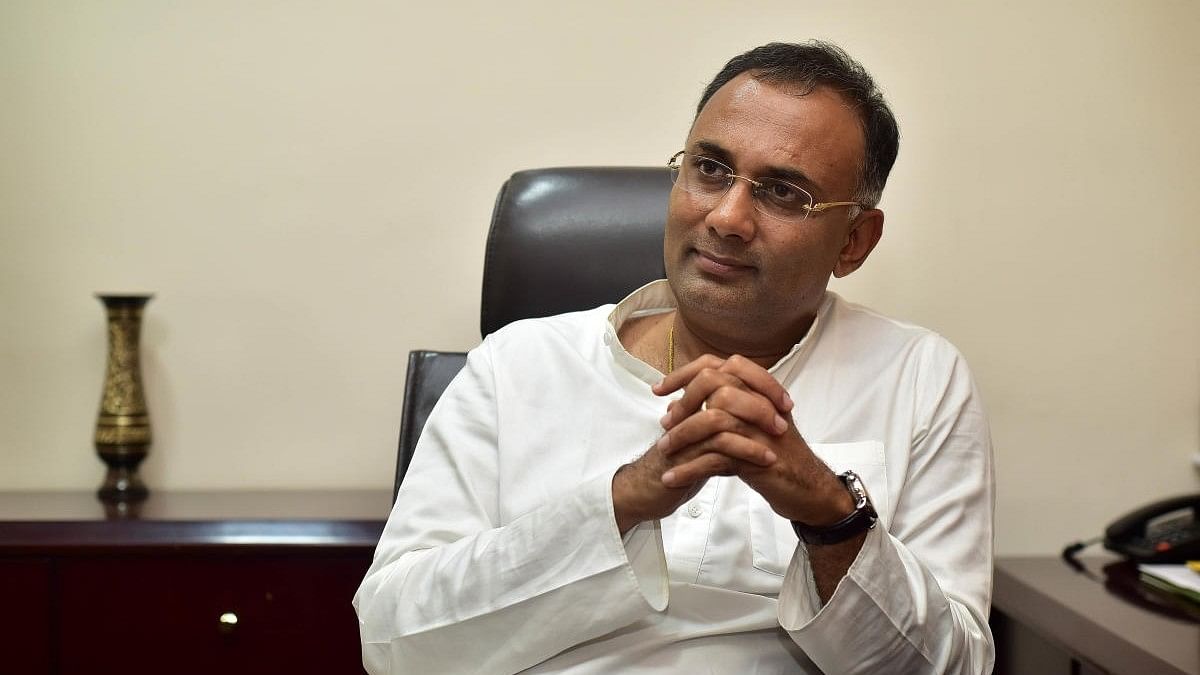
Karnataka Health & Family Welfare Minister Dinesh Gundu Rao.
Credit: DH File Photo
In just about six months since he took over as Minister for Health & Family Welfare, Dinesh Gundu Rao has had his hands full. He has rolled out several new schemes like Gruha Arogya that entails door-to-door health screening, besides taking up comprehensive review of the existing schemes to streamline their implementation. He is also pushing for rehauling of the 108 Ambulance system and introducing Artificial Intelligence to enhance the efficiency of the public healthcare in the state and putting together an E-Management system to weed out corruption dogging healthcare. In an exclusive interview with DH, Dinesh Gundu Rao spells out his vision for strengthening Karnataka’s healthcare system.
Excerpts:
1.You launched the Platform for Research, Integrated Surveillance and Management of Health (PRISM-H) for disease surveillance in Karnataka. How robust is this system in helping monitor and predict the spread of disease ahead of time?
We want to study and understand how effectively this system can forewarn or predict the outbreak of diseases. The feedback so far has been positive and it is said to be a good tracking system. At present, this has been developed to track dengue or any other vector-borne diseases. It was specifically developed during the period when the cases were increasing. It will be extended to track other diseases, depending on how good a predictive analysis it can offer.
2.You had mentioned that cases of medical negligence would be taken seriously and a system would be put in place to assess staff performance. How far has this progressed?
We are in the process of developing an E-Management system which will help us analyse how doctors and paramedical staff are performing. We don't have such a system in place at the moment. The tenders have gone for approval. A robust system like this, that will roll out in a year's time, will help us look at the efficiency of our health system. We will have information on how each hospital and healthcare system is fairing, how many surgeries each doctor has performed and in and out patient analysis. This will help weed out corruption and provide good healthcare in a non-partisan manner.
3. How well prepared is Karnataka under your government to address any outbreaks like Covid in the future?
We are well prepared because the control rooms and protocols are already in place. We have enough equipment, in terms of oxygen cylinders, ICU beds, ventilators and almost all district hospitals have good basic infrastructure. There are regular reviews of vaccinations and which districts are falling behind and why. Efforts are on to bring down maternal mortality and infant mortality rates.
4. Your new scheme Gruha Arogya offers health check-ups at the doorstep of villagers through mobile units having medical professionals and diagnostic equipment. How is it progressing?
The first stage of Gruha Arogya will roll out in eight districts. It will, in phases, cover all other districts by the end of next year. This scheme will offer door-to-door health care. Cases of hypertension, diabetes or anything that can be detected through oral examination will be covered under this scheme. Those who are affected will be given free treatment and we will procure the medicines and give it to people through a package system. The idea is to first control diabetes and hypertension which are the two root causes for almost all ailments. Once we build a system, we will extend this to cover detection of breast and cervical cancer.
5.How is the enrolment of private hospitals in Yashaswini health scheme that seeks to provide assistance to farmers and weaker sections? The initial response was poor. How have you tackled this?
Karnataka is one of the better states in getting private hospitals empanelled under schemes of this kind. The problem right now is the non-revision of charges for various procedures for the last five years as per Ayushman Bharat-Arogya Karnataka scheme. Representatives of private hospitals have been asking us to revise these rates because they find it difficult to bear the cost and say that they will have to increase the cost. We will soon be putting up a proposal to increase the rates.
6. The tenders for 108 ambulances have not been floated yet and the promise of smooth ambulance connectivity across the state remains on paper? Why?
Karnataka was an exemplary state in operating 108 ambulances when it was first launched in 2008. But, over the years, we have fallen behind because things have not been followed with due diligence and different players have tried to scuttle the tendering process where tenders have been passed without scrutiny. We have now put in place a technical committee which will look into bringing in transparency in the tender process and also do a comparative analysis of how ambulances are operating in four or five states. We will use these findings to strengthen our system and revive it in an efficient manner.
7. You have been pushing for bringing in Artificial Intelligence (AI) into the healthcare system. Tell us about it?
Artificial Intelligence (AI) is the way forward in healthcare. This government will push for AI, telemedicine, tele-ICUs, AI-enabled screenings. Every district hospital will soon have digital x-rays. Only AI can help us do mass screenings, detection and prevention of diseases. We are also working with different entities such as Centre for Cellular And Molecular Platforms (C-CAMP) and use expert advice to see how AI can be taken to the grassroot level.